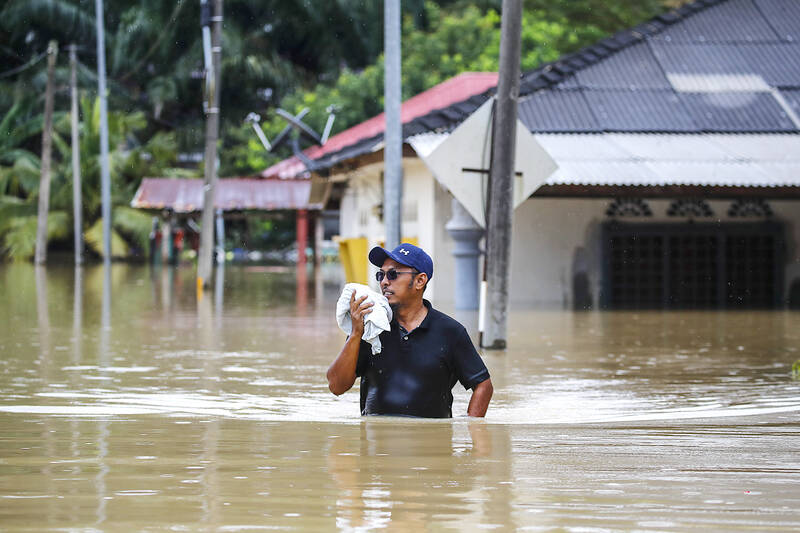At least four people have died and nearly 41,000 were evacuated in Malaysia after floodwaters caused by “unusual” torrential rains lasting days swept through several states, officials said yesterday.
Local reports and social media posts showed images of flooded roads, submerged vehicles, waterlogged homes and rows of shops closed in the affected areas, mainly in the southern state of Johor near neighboring Singapore.
The rains have continued unabated, hampering relief efforts.

Photo: EPA-EFE
At least four people have died since Wednesday, including a man whose car was swept away by floodwaters and an older couple who drowned, police said.
Nearly 41,000 people from six states, although mostly from Johor, have been evacuated to schools and community centers where food, water and clothes were provided.
The latest fatality was a 68-year-old woman who drowned near her flooded house after she left an evacuation center in Segamat, a town in Johor, police said.
In the Johor town of Yong Peng, journalists saw a family wading in brown waters above knee-deep outside their home, with their children using tire tubes as floats.
Safiee Hassan, 38, said he and his family managed to save their refrigerator, sofa and some electrical items.
“Other things like our bed, mattress, cupboard, are damaged,” he said.
Malaysian Nature Society president Vincent Chow that these are the worst floods to hit Johor since 1969.
Chow said he had received urgent calls for help from villagers living along a riverbank in Peta village, about 120km north of Yong Peng.
“People are crying for food and medicine. The only way to provide food and clothes is by air,” he said.
Malaysia is facing unprecedented continuous torrential rain from the annual monsoon season that began in November last year.
The Southeast Asian nation often experiences stormy weather around the year’s end, with seasonal flooding regularly causing mass evacuations and deaths.
However, Meenakshi Raman, president of environmental group Friends of the Earth Malaysia, said that the large volume of rainfall is “unusual” at this time of the year, blaming the flooding on the lack of green spaces.
“Forest and land clearings in the upper reaches of our rural areas, towns and cities lead to our rivers and drains choked with soil erosion and they cannot contain the increased volumes of rainfall,” Meenakshi said. “Moreover, the over-concretizing of areas also leads to overflows of water, as there is little green left to act as sponges.”
The Meteorological Department has warned that the rain could go on until next month.

RIGHTS FEARS: A protester said Beijing would use the embassy to catch and send Hong Kongers to China, while a lawmaker said Chinese agents had threatened Britons Hundreds of demonstrators on Saturday protested at a site earmarked for Beijing’s controversial new embassy in London over human rights and security concerns. The new embassy — if approved by the British government — would be the “biggest Chinese embassy in Europe,” one lawmaker said earlier. Protester Iona Boswell, a 40-year-old social worker, said there was “no need for a mega embassy here” and that she believed it would be used to facilitate the “harassment of dissidents.” China has for several years been trying to relocate its embassy, currently in the British capital’s upmarket Marylebone district, to the sprawling historic site in the

A deluge of disinformation about a virus called hMPV is stoking anti-China sentiment across Asia and spurring unfounded concerns of renewed lockdowns, despite experts dismissing comparisons with the COVID-19 pandemic five years ago. Agence France-Presse’s fact-checkers have debunked a slew of social media posts about the usually non-fatal respiratory disease human metapneumovirus after cases rose in China. Many of these posts claimed that people were dying and that a national emergency had been declared. Garnering tens of thousands of views, some posts recycled old footage from China’s draconian lockdowns during the COVID-19 pandemic, which originated in the country in late

French police on Monday arrested a man in his 20s on suspicion of murder after an 11-year-old girl was found dead in a wood south of Paris over the weekend in a killing that sparked shock and a massive search for clues. The girl, named as Louise, was found stabbed to death in the Essonne region south of Paris in the night of Friday to Saturday, police said. She had been missing since leaving school on Friday afternoon and was found just a few hundred meters from her school. A police source, who asked not to be named, said that she had been

BACK TO BATTLE: North Korean soldiers have returned to the front lines in Russia’s Kursk region after earlier reports that Moscow had withdrawn them following heavy losses Ukrainian President Volodymyr Zelenskiy on Friday pored over a once-classified map of vast deposits of rare earths and other critical minerals as part of a push to appeal to US President Donald Trump’s penchant for a deal. The US president, whose administration is pressing for a rapid end to Ukraine’s war with Russia, on Monday said he wanted Ukraine to supply the US with rare earths and other minerals in return for financially supporting its war effort. “If we are talking about a deal, then let’s do a deal, we are only for it,” Zelenskiy said, emphasizing Ukraine’s need for security guarantees